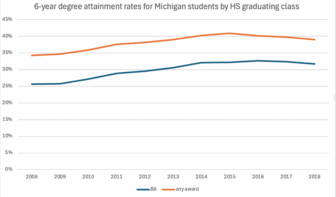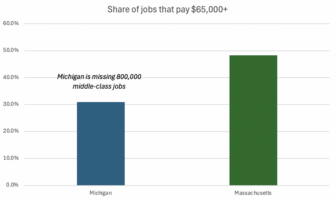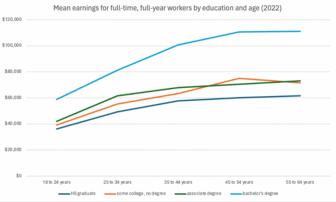
Reading Richard Whitmire’s worth reading The B.A. Breakthrough reminded me why Michigan Future has been supportive of charter schools from their inception in Michigan more than a quarter of century ago. Largely because they provide an alternative to chronically failing big city school district’s schools.
Whitmire chronicles how the best of the national charter networks have 40-50 percent of their graduates earning life-changing four-year degrees by six years after graduating high school. Particularly inspiring is the stories he tells of the success students of these charters now enjoy as adults that would, almost certainly, not have happened if they did not have an option of attending a charter school. These are the kind of results we hoped that charter schools serving predominantly low-income minority students in Michigan would achieve.
To be clear, the networks Whitmire writes about are not typical of the charter sector across the country. A recently released study, School Choice in the United States: 2019, by the National Center of Education Statistics, an agency of the Betsy DeVos led U.S. Department of Education, found that:
In 2017, no measurable differences in average 8th-grade reading and mathematics scores on the National Assessment of Educational Progress (NAEP) were observed between students in traditional public and public charter schools. This pattern persisted after taking into account how differences in parents’ educational attainment were related to the assessment scores.
So, by and large, nationally charter schools have not lived up to their promise of superior student outcomes. The national networks that Whitmire writes about are exceptions to the rule.
That brings us to our disappointment with Michigan charter schools. The simple reality is the charter sector in Michigan has not produced schools with the kind of stellar four-year degree completion rates Whitmire chronicles. College completion data for six years after high school graduation is only available for the graduating class of 2012 or before. Of the graduating class of 2012 the six year completion rate for three of the high profile Detroit area charter schools are 22.7 percent for the Henry Ford Academy; 16.5 percent for the Thompson Foundation‘s University Preparatory Academy; and 8.8 percent for Cesar Chavez Academy.
You can find college progression, including completion, data at mischooldata.org for any district or charter high school in Michigan.
(The schools that Michigan Future Schools funded do not have a graduating class with six year completion data yet. But the current progression of their graduates makes it highly likely that their six year graduation rates will look like the schools above.)
The question is “why have Michigan charters not participated in the breakthrough schooling for low-income minority students that Whitmire chronicles from around the country?” From what we can tell there are three core differences between the charters here and the successful national charters:
- Four-year degree completion obsession. The national charter networks that Whitmire writes about promise parents that their children will earn a four-year degree and are obsessed with fulfilling that commitment. Including making changes in their programming as they constantly learn what works and what doesn’t.
- Rigorous academics. Although we are skeptical that test scores are a good predictor of college success, it is clear that there are reading, writing and math foundation skills that students need to succeed in college. The charter networks Whitmire writes about have developed the curriculum and pedagogy to build those skills in most of their students
- College advising. The B.A. Breakthrough is predominantly a book about the college advising playbook used by the national networks that are achieving high college graduation rates. With an emphasis on college matching: getting students into the most selective school they can afford. Matching is one of the keys to high low-income minority college graduation.
The challenge for us in Michigan is to figure out how we get charter schools here that do a far better job of preparing students, particularly low-income students of color, for the kind of life-changing college completion results that the best national charters are achieving.







